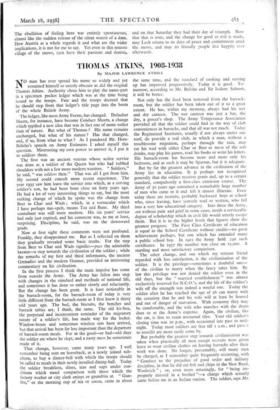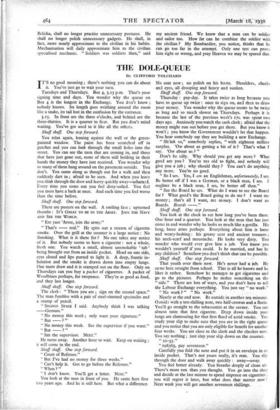THOMAS ATKINS, 1908-1938
By MAJOR LAWRENCE ATHILL
NO man has ever spread his name so widely and yet remained himself so utterly obscure as did the original Thomas Atkins. Authority chose him to play the name-part in a specimen pocket ledger which was at the time being issued to the troops. Fate and the troops decreed that he should step from that ledger's title page into the boots of the whole British Army.
The ledger, like most Army Forms, has changed. Defaulter Sheets, for instance, have become Conduct Sheets, a change which typified a new idea that was in fact one of name rather than of nature. But what of Thomas ? His name remains unchanged, but what of his nature ? Has that changed, and, if so, from what to what ? As I pondered Mr. Hore- Belisha's speech on Army Estimates I asked myself this question. Mistrusting my own power to answer it, I put it to soldiers three.
The first was an ancient veteran whose active service was done as a soldier of the Queen but who had rubbed shoulders with not a few more modern warriors. " Soldiers," he said, " was soldiers then." That was all I got from him. My second could consult more recent experience. The year 1935 saw him leave the service into which, as a serving soldier's son, he had been born close on forty years ago. He had a lot of very interesting things to say, but the most striking change of which he spoke was the change from Beer to Char and Wads; which, in a vernacular which I have perhaps mis-spelt, means Tea and Buns. My third consultant was still more modern. His six years' service had only just expired, and his comment was, to me at least, surprising. Discipline, he said, was on the downward grade.
Now at first sight these comments were not profound. Frankly, they disappointed me. But as I reflected on them they gradually revealed 'some basic truths. For the step from Beer to Char and Wads signifies—pace the admirable brewer—a step towards the civilisation of the soldier ; while the remarks of my first and third informants, the ancient Grenadier and the modem Gunner, provided an interesting commentary on his civilisation.
In the first process I think the main impulse has come from outside the Army. The Army has fallen into step with changes in the standard and methods of national life, and sometimes it has done so rather slowly and reluctantly. But the change has been great. It is least noticeable in the barrack-room, for the barrack-room of today is very little different from the barrack-room as I first knew it thirty odd years. ago. The bed, the biscuits, the benches and barrack tables are, I think, the same. The old kit-box, the perpetual and inconvenient reminder of the migratory nature of a soldier's life, has made way for the locker. Window-boxes and sometimes wireless sets have arrived, but that arrival has been far less important than the departure of barrack-room meals. For in the good—or bad—old days the soldier ate where he slept, and a nasty mess he sometimes made of it.
That change, however, came many years ago. I well remember being sent on horseback, as a newly joined sub- altern, to buy a dinner-bell with which the troops should be called to meals in their newly installed dining-hall. Today the soldier breakfasts, dines, teas and sups under con- ditions which stand comparison with those which the factory worker or city clerk enjoys or grumbles at. " Gun- fire," or the morning cup of tea or cocoa, came in about the same time, and the standard of cooking and serving up has improved progressively. Today it is good. To- morrow, according to Mr. Belisha and Sir Isidore Salmon, it will be better.
Not only has the food been removed from the barrack- room, but the soldier has been taken out of it to a great extent. He has, within my memory, always had his wet and dry canteen. The wet canteen was just a bar, the dry, a grocer's shop. The Army Temperance Association provided all that the soldier could find in the way of club conveniences in barracks, and that all was not much. Today the Regimental Institutes, usually if not always under one roof, do provide a real club, in which a man, without a troublesome migration, perhaps through the rain, may eat his wad with either Char or Beer or most of the soft drinks, may play his games, read his books or write his letters. His barrack-room has become more and more only his bedroom, and as such it may be Spartan, but it is adequate.
But by far the greatest advance in the civilisation of the Army lies in education. It is perhaps not recognised generally that the soldier receives gratis and, up to a certain standard, compulsorily a first-class extension course. The Army of 3o years ago contained a remarkably large number of men who came to it and left it almost illiterate. Even today there are recruits, probably backward boys at school who, since leaving, have scarcely read or written, who fall into a very low educational category. Into these the Army, not without pain and grief in some cases, instils a serviceable degree of scholarship which in civil life would utterly escape them. But it is in the higher levels that figures show the greatest progress. The First Class Certificate of education is equal to the School Certificate without credits—no great achievement perhaps, but one which has extended many a public school boy. In 1921 the Army held 240 such certificates. In 1937 the number was close on 12,000. A startling and most satisfactory comparison.
The other change, and one which my veteran friend regarded with less satisfaction, is the civilianisation of the soldier. It is the privilege—sometimes a doubtful one— of the civilian to marry when the fancy takes him. By law this privilege was not denied the soldier even in the old days, but the " married establishment " was almost exclusively reserved for N.C.O.'s, and the life of the soldier's wife off the strength was indeed a woeful one. Today the soldier after he has reached the age of 26 can marry with the certainty that he and his wife will at least be housed and out of danger of starvation. With economy they may be comfortable, and the wife who marches with the drum does so at the Army's expense. Again, the civilian, like the cat, is free to roam nocturnal tiles. Your old soldier's closing time was to p.m., with occasional late pass to mid- night. Today most soldiers are free till r a.m., and pass:s to reveille are more easily come by.
But probably the greatest step towards civilianisation was taken when practically all men except recruits were given leave to wear civilian clothes on leaving barracks after their work was done. No longer, presumably, will many men be charged, as I remember quite frequently occurring, with " Conduct to the prejudice of good order and military discipline, in that he did eat fish and chips in the New Road, Woolwich " ; or, even more amazingly, for " being im- properly dressed in a brothel "—a charge which actually came before me in an Indian station. The soldier, says Mr. Belisha, shall no longer practise unnecessary postures. He shall no longer polish unnecessary gadgets. He shall, in fact, more nearly approximate to the civilian in his habits. Mechanisation will daily approximate him to the civilian specialised mechanic. " Soldiers was soldiers then," said my ancient friend. We know that a man can be soldier and sailor too. How far can he combine the soldier with the civilian ) My Bombardier, you notice, thinks that he can go too far in the attempt. Only one test can prove him right or wrong, and pray Heaven we may be spared that.















































 Previous page
Previous page